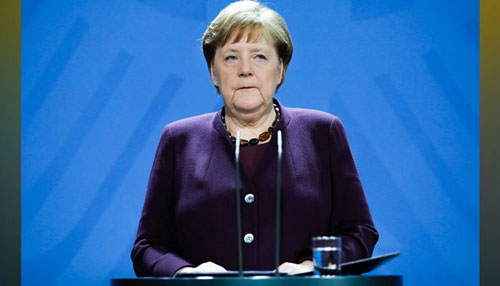Berlin
German Chancellor Angela Merkel has warned that it will become difficult to tackle with the coronavirus in the coming autumn and winter months.
“Some things are likely to be more difficult over the next few months than they are in the summer,” Merkel said while addressing her annual summer press conference on Friday.
“We have all enjoyed the freedoms and relative protection from aerosols in the summer, which is possible through life outdoors,” she said, referring to micro-particles that are thought to spread through the air, especially in enclosed spaces.
Merkel’s comments came after she agreed a wave of new measures with the leaders of Germany’s 16 federal states on Thursday designed to combat rising case numbers in Germany blamed mainly on summer travel and private parties.
The measures include a minimum fine of 50 euros ($59) for anyone caught without a face mask in places where wearing one is compulsory, a ban on large events until the end of the year and new quarantine rules for travellers. “We will have to live with this virus for a long time to come. It is still serious. Please continue to take it seriously,” Merkel warned.
“Not everything will be the same as before the pandemic, it will hit us hard and existentially,” she added.
Germany has fared relatively well in its battle to contain the virus so far but like many other European countries has seen a new surge in cases in recent weeks.
On Friday it reported 1,571 new cases, bringing the total to 239,507, according to the Robert Koch disease control institute.
The country has so far recorded 9,288 deaths. Meanwhile, A new study looking at male and female immune responses to the new coronavirus may shed new light on why men are more likely to become seriously ill with Covid-19, researchers said on Wednesday.
Since early in the pandemic it has been clear that men, particularly older men, are at a far higher risk of dying from the virus than women of a similar age, but scientists have not yet been able to pinpoint exactly why.
A new study published in the journal Nature noted that globally men account for about 60 per cent of deaths from Covid-19 and looked at whether differences in immune responses could explain why.
“What we found was that men and women indeed develop different types of immune responses to Covid-19,” said the study’s lead author Akiko Iwasaki, a professor at Yale University, in a video.
The immunity specialist said “these differences may underlie heightened disease susceptibility in men”.
Researchers collected nasal, saliva, and blood samples from non-infected control subjects and patients with the disease who were treated at Yale New Haven Hospital in the United States.
They then monitored patients to look at their immune responses.
Researchers found that women mounted a more robust immune response involving T lymphocytes, which are a type of white blood cell that can recognise viruses and eliminate them. This was the case even among older women, the study found.—AFP










